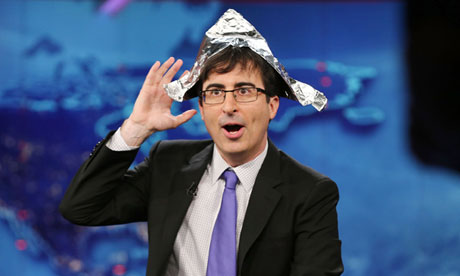"The Guardian: John Oliver's Viral Video Is The Best Climate Debate You'll Ever See"
http://paxonbothhouses.blogspot.com/2014/05/the-guardian-john-olivers-viral-video.html
***
False equivalence in the media — giving equal weight to unsupported or even discredited claims for the sake of appearing impartial — is not unusual. But a major media organization taking meaningful steps to do something about it is.
Earlier this month, the BBC’s governing body issued a report assessing the BBC’s impartiality in covering scientific topics. When it comes to an issue like climate change, the report concluded, not all viewpoints share the same amount of scientific substance. Giving equal time and weight to a wide range of arguments without regard to their credibility risks creating a “false balance” in the public debate.
This is a lesson for all media on both sides of the Atlantic — and not just when it comes to science coverage. There are many sides to almost every story, but that doesn’t mean they are automatically equal.
Unfortunately, too much of the media has become increasingly fixated on finding “balance,” even if it means presenting fiction on par with fact. If media outlets wanted to present an accurate account of the climate change “debate,” for instance, they would have to follow comedian John Oliver’s lead and host a “statistically representative” face-off with three climate change deniers up against 97 scientists armed with proof. Instead, they contort themselves to find “balance,” and we’re left with segments like “Is the climate change threat exaggerated?” — presented on the always reliable Fox News — which promised to “weigh the evidence on both sides of the divisive topic.” It’s no wonder that only 60 percent of Americans know that most scientists agree that global warming is occurring — and almost 30 percent aren’t sure if there is any scientific consensus.
It’s not just right-wing megaphones that subscribe to this kind of journalism. As Media Matters has documented, when reporting on the 2013 United Nations’ Intergovernmental Panel on Climate Change fifth assessment report, mainstream outlets like the Wall Street Journal and The Post gave, on average, the three percent of doubters “over five times the amount of representation [they have] in the scientific community.” The result, as Bill McKibben has said, is “a massive failure of journalism to communicate the idea to the public that the most dangerous thing that ever happened in the world is in the process of happening.” (Indeed, the Los Angeles Times is unusual for its policy of not publishing letters to the editor that deny man’s role in climate change.)
As political scientists Thomas Mann and Norm Ornstein have written, “A balanced treatment of an unbalanced phenomenon distorts reality.” And this isn’t just true when it comes to science coverage — the media has a similar tendency to issue unfiltered “he said, she said” accounts of political issues. The result is that every controversy seems to be reduced to a binary debate between two equal sides. In 2013, when congressional Republicans shut down the government over a health-care law that had been passed in Congress and upheld in the Supreme Court, many in the media continuedto pretend that both sides were equally at fault.
My Nation colleague Eric Alterman once wrote that no matter how “outlandish, illogical, or simply untrue,” an argument may be, too many editors and journalists bind themselves to “an outdated commitment to the ideal of objectivity.” This approach has real consequences on the public’s understanding of society’s most pressing challenges — including the effects of global warming.
Gallup’s 2014 poll on the environment found that 42 percent of Americans believe that “the seriousness of global warming is generally exaggerated in the news.” Blinded by the veil of false equivalence, we believe global warming is happening, but that it won’t seriously affect us. As a result, we are not holding our elected leaders accountable for acting to curb the threat of climate change, which only grows more dangerous over time.
Ultimately, forcing balance where there is none is not journalistically ethical. It’s not part of the proud and essential tradition of truth telling and evaluation, either. At best, it’s lazy. At worst, it’s an abdication of the media’s responsibility.
Rather than uncritically repeating talking points, isn’t it time for the media to take the BBC’s bold advice and exercise editorial judgment? Because if the scale tips in favor of the truth, that’s not imbalanced reporting. That’s journalism.
Read more from Katrina vanden Heuvel’s archive or follow her on Twitter.

No comments:
Post a Comment